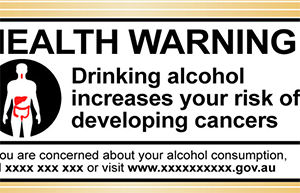12 October 2014
 New Australian research suggests cancer warning statements on alcoholic beverages can be used to increase awareness about the relationship between alcohol consumption and cancer risk. Findings of a survey of more than 2000 drinkers suggests this is especially so when the messages are more specific – such as “alcohol increases your risk of bowel cancer” rather than a more general “alcohol causes one in 20 cancer deaths”.
New Australian research suggests cancer warning statements on alcoholic beverages can be used to increase awareness about the relationship between alcohol consumption and cancer risk. Findings of a survey of more than 2000 drinkers suggests this is especially so when the messages are more specific – such as “alcohol increases your risk of bowel cancer” rather than a more general “alcohol causes one in 20 cancer deaths”.
The research was conducted by researchers from Curtin University, the University of Western Australia and the Cancer Council WA. The findings have been published in an open access article in the section of Health behaviour, health promotion and society of BMC Public Health. The scope of the research was to gauge how drinkers might respond to warning labels about cancer on alcohol and which messages might work best. It was found that younger, more educated drinkers – especially women – were more likely to find the messages believable and relevant. Particularly interesting was the finding that heavy drinkers were also more likely to consider the messages personally relevant than people who drank less.
“This is encouraging because this group is most at short-term and long-term risk from the harmful effects of alcohol,” Professor Simone Pettigrew of Curtin University’s School of Psychology told the Sydney Morning Herald.
The lead researcher argues that warning labels are needed on alcohol because it is well known that drinking can lead to hazardous driving, while people are less aware of the cancer connection.
“People we interview tend to think that drinking “in moderation” – which typically they don’t define – isn’t harmful and that red wine especially can benefit heart health,” she says. “The “good” news about alcohol consumption seems to be more readily accepted than “bad” news and the negatives of drinking are usually seen as confined to young binge drinkers or alcoholics.”
“We know the risk of these cancers goes up the more you drink, so cutting down is an especially important message for those who are heavier drinkers. It’s not about becoming teetotal but if you drink a lot each night, reducing it is one of the positive measures you can take.”
“We don’t want to rush in and say labels are the way to go – they’re likely to be one of a raft of measures to support lower levels of drinking. But if food is required to have health related information on the label, why not alcohol?”
The article, , can be read online at BMC Public Health.
Source: 10/06/14

